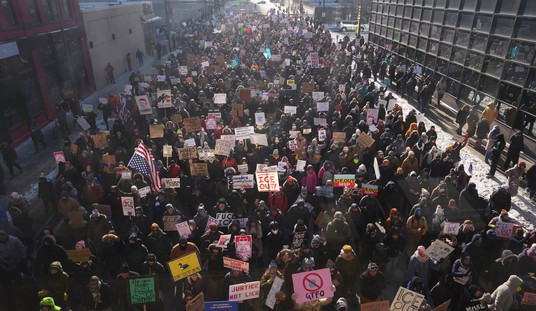John McCain and Barack Obama are now engaged in a long-distance dispute over whether talking to America’s enemies is integral to America’s security (with neither one wishing to talk to poor Hillary Clinton any longer).
McCain has not so subtly assailed Obama as an “appeaser” for his stated willingness to sit down with the Iranian leadership about its nuclear weapons program and sponsorship of jihadism in Iraq — and never mind for now if that leadership consists of Mahmoud Ahmadinejad or Ali Khamenei. Meanwhile, Obama has repeatedly labeled McCain a kind of hyper-Bush militarist of the shoot first, sign treaties later school of foreign policy. McCain has hinted at Chamberlain and Munich, always a histrionic conversation-ender in matters of these sort, and Obama has sheepishly downplayed the Iranian threat by contrasting it against the Soviet one, and, without any hint of irony, indicating Kennedy’s talks with Khrushchev in Vienna, and Reagan’s momentous mini-summit with Gorbachev in Reykjavik as proof that toughness and diplomacy are not mutually exclusive concepts. (One witty editorial in The New York Times reminded Obama that Camelot’s finest hour was not its Austrian kibitz with the Russian premier, an event that laid all the psychological bricks, so to speak, for the erection of the Berlin Wall and the Cuban missile crisis.)
Oddly though, in their rush to analogize by way of chivvying each other, neither candidate has actually pulled an example relevant to the region of the globe now under discussion. The Middle East, a term coined by Alfred Thayer Mahan, one of McCain’s boyhood idols, is where both American warfare and American diplomacy began in the late 18th century, as our infant republic faced its first post-Revolutionary struggle against the evocatively named Barbary States of the Ottoman Empire.
Jaw-jaw competed with war-war, all right, with the latter eventually winning out.
The regencies of Tripoli, Tunis, and Algiers (future homes of Muammar Qaddafi, Yasser Arafat, and the Islamic Salvation Front, respectively) had been hosting and sponsoring Islamic piracy since the Middle Ages. Scimitar-wielding corsairs would regularly interrupt the flow of trade and traffic along the coasts of North Africa, seizing European vessels and taking their crews into bondage. Cervantes wrote his first play, in the 16th century, about the dread corsairs, and by the 18th, the American colonies had a minor seagoing presence in the Mediterranean protected by the redoubtable British Navy. But the Crown was reluctant to war against so petty an antagonist, preferring to pay “tribute” to the Barbary States instead, as a shopkeeper would protection money to the mafia. After the U.S. broke away from England and became its own nation, however, the geopolitical dynamics changed, as did the American equanimity with doing business with pirates.
In 1784, corsairs attacked the Betsy, a 300-ton brig that had sailed from Boston to Tenerife Island, about 100 miles off the North African coast, selling her new-made citizens as chattel on the markets of Morocco. The U.S. was not free of its own moral taint of slavery, of course, but it would be impossible to hasten the industrial development that would eventually render the agrarian-plantation economy obsolete if merchant ships could not be assured of safe conduct near the Turkish Porte. Other vessels, such as the Dauphin and Maria, were also seized, this time by Algiers, and the horrifying experiences of their captive passengers relayed back home were the cause for outrage. James Leander Cathcart described the dungeon in which he was being kept as “perfectly dark…where the slaves sleep four tiers deep…many nearly naked, and few with anything more than an old tattered blanket to cover them in the depth of winter.”
In response, Thomas Jefferson, then the Minister to France, suggested a multilateral approach of what we would now term “deterrence.” He asked that Spain, Portugal, Naples, Denmark, Sweden and France enter into a coalition with America to dissuade the regencies from their criminal assaults on life, liberty and the pursuit of international commerce. As Michael Oren, in his magisterial history Power, Faith, and Fantasy: America in the Middle East: 1776 to Present relates, “By deterring, rather than appeasing, Barbary, the United States would preserve its economy and send an unambiguous message to potentially hostile powers.” Jefferson thought it would impress Europe if America could do what Europe had failed to do for centuries and beat back the persistent thuggery of Islamists. “It will procure us respect,” said the author of the Declaration of Independence. “And respect is a safeguard to interest.”
This sober judgment fused the cold calculations of latter-day “realism” with the morality behind revolutionary interventionism: not only would America protect its citizens from plunder and foreign slaveholding; it would ensure that other countries under “Christendom” were similarly protected.
Though Jefferson found a stalwart Continental ally in a former one, the Marquis de Lafayette, France squelched the idea of a NATO made of buckshot and cannon. While waiting for funds that would never come from Congress for the construction of a 150-gun navy, the sage of Monticello resigned himself to further diplomacy with the enemy. In 1785, he dispatched John Lamb, a Connecticut businessman, to secure the release of hostages in Algiers, held by its dynastic sovereign Hassan Dey. Lamb failed ignominiously.
At the same time, John Adams, then minister to England, agreed to receive the pasha of Tripoli, ‘Abd al-Rahman al-Ajar, in his London quarters to discuss a possible peace deal. Adams described his interlocutor as a man who looked all “pestilence and war,” a suspicion that was soon confirmed by the pasha’s demand of 30,000 guineas for his statelet, plus a 3,000 guinea gratuity for himself. He also did Adams the favor of estimating what it would cost the U.S. to broker a similar deal with Tunis, Morocco and Algiers — the total price for blackmail would be about $1 million, or a tenth the annual budget of the United States.
Adams was incensed. “It would be more proper to write [of his meeting with ‘Abd al-Rahman] for the… New York Theatre,” he thundered. He agreed with Jefferson that a military response was increasingly likely, but Adams doubted his country’s economic ability to sustain it. For the short term, he thought it better to offer “one Gift of two hundred Thousand Pounds” rather than forfeit “a Million annually” in trade revenue, which the pirates were sure to disrupt. Not long thereafter, Jefferson joined him in London to prevent the “universal and horrible War” and reach an accord with the refractory envoy from Tripoli. Both gentlemen of the Enlightenment, and comrades in revolution, affirmed America’s desire for peace, its respect for all nations, and suggested a treaty of lasting friendship with the regency. ‘Abd al-Rahman listened well, but his reply was one that would shock modern ears less than it did those of the two Founding Fathers:
“It was… written in the Koran, that all Nations who should not have acknowledged [the Muslims’] authority were sinners, that it was their right and duty to make war upon wheoever they could find and to make Slaves of all they could take as prisoners, and that every Mussulman who should be slain in battle was sure to go to Paradise.”
Though a period of paying tribute and douceurs (or “softeners” — expensive trickets and toys) to Islamic pirates would continue, the words of ‘Abd al-Rahman Adams were chilling enough to leave Adams and Jefferson in no doubt as to the sanguinary and messianic nature of their adversary. “An angel sent on this business,” lamented Jefferson, “could have done nothing” to placate such men. He called them “sea dogs” and a “pettifogging nest of robbers.” The episode preceded further acts of piracy against American vessels and the imprisonment and sale of its crews and passengers, and was enough to get Jefferson to overlook his wariness of federalism and agree to a Constitution with a strong central government capable of building and keeping a powerful navy. Adams, as it turned out, was more worried that American opinion wouldn’t rally for war, or accept its dire consequences. But the Philadelphia convention that drafted our national covenant in 1787 was hastened, and its welter of opinions unified, by the Barbary question. As the historian Thomas Bailey wrote, “In an indirect sense, the brutal Dey of Algiers was a Founding Father of the Constitution.”
America still sued for peace. The Betsy‘s release had been negotiated, albeit abjectly, and to the accompaniment of America’s first diplomatic accord, the Treaty of Peace, Friendship and Ship-Signals, signed with Morocco in 1786. But no sooner was the ship let go and its captives freed than it was recaptured by Tunis and renamed the Mashuda. Also, Washington at one point found itself spending 20% of its annual revenue in paying blackmail to a loose confederation of terrorists on the high seas. Under Jefferson’s presidency, the first era of American military predominance was inaugurated, with men like William Bainbridge, William Eaton and the Byronic swashbuckler Stephen Decatur, becoming folk heroes. Their legacies would be fondly remembered by Patton as he alighted, a century and a half later, on the shores of Morocco and Algeria, this time to defeat another barbaric and imperial menace — the Nazis.
If there is a lesson to be had in all this, it is that talk is not cheap in matters of geopolitics, and can be instructive in ways one hadn’t even considered.
But no commander-in-chief need be blind to the arrogance and intransigence of his foe, particularly when it is an Islamist one. (And Jefferson and Adams did not have to contend with a foe seeking the ultimate means of apocalypse.) Santayana got it backwards, in fact: even those who remember history are still doomed to repeat it.
That goes double for America’s involvement in the Middle East.









Join the conversation as a VIP Member